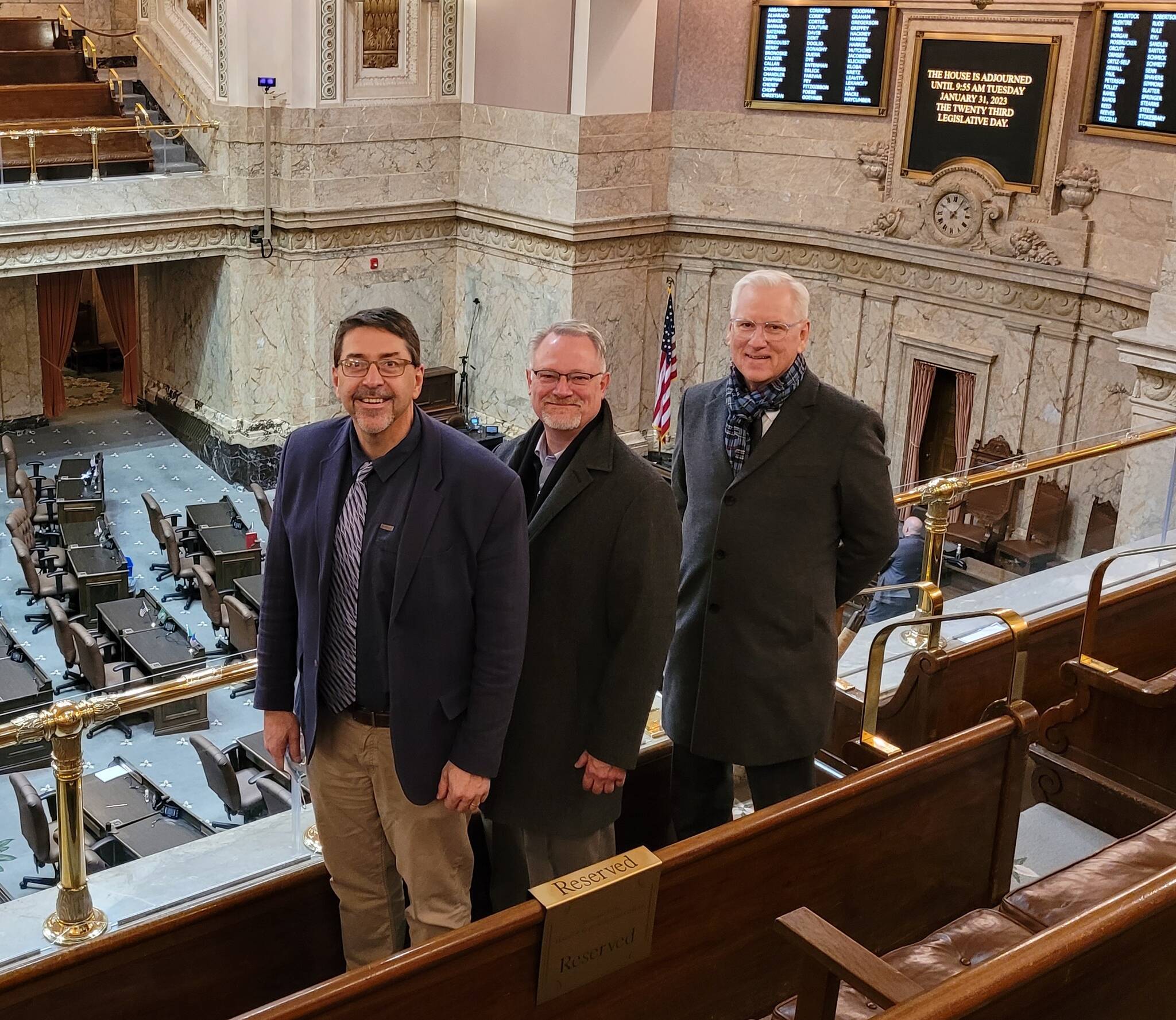The superintendents from Lopez, Orcas and San Juan Island school districts traveled to Olympia Jan. 30 to make the case for parity in school funding.
“It was productive and informative,” San Juan Island School District Superintendent Fred Woods said, “we went down to talk about regionalization and lifting the levy lid, and learned about bills potentially increasing funding for special education and transportation.”
Regionalization went into effect six years ago as a way to provide more funding for schools that live in more expensive areas, as gauged by higher property values.
Rather than looking at each county, however, legislators averaged the property values of an entire region. This meant not only were islands’ property values not taken into account, but neither was the unique situation of being surrounded by water.
As islanders know, water impacts all areas of life, making cost of living more expensive and access to resources difficult. Simply attending a sports event can be a monumental hurdle for students. Yet, due to regionalization, San Juan County’s schools only receive 12 percent funding, as opposed to Seattle schools that receive 18 percent.
Districts like Granite Falls also only receive 12 percent. What that has meant to them, according to a video the Granite Falls put together, is that teachers can drive ten miles out of Granite Falls and be paid significantly higher wages. Attraction and retention have become a struggle.
For the Orcas Island School District, the adjustment from Staff Mix Factor to low Regionalization Factor has significantly impacted the school’s revenue each year since 2018. “Moving from 12 to 18 percent would generate approximately 240,00 per year to help offset the high cost of operating a public school in San Juan County,” Orcas Island School District Superintendent Eric Webb said, adding that a one percent increase would mean an additional $40,000.
For San Juan, according to Woods, that number would mean an increase of roughly $69,000 at one percent, or $400,000 if the county was adjusted to 18 percent.
The second issue the three superintendents are requesting from legislators is lifting the levy cap. Currently, despite voters’ consistent support for school levies, the island districts can not collect the full amount since 2020, due to state law. Lifting the cap could mean over approximately $400,000 local schools could collect each year that voters have already approved. Representatives Alex Ramel, Debra Lekanoff and over a dozen others have sponsored House Bill 1244, which states it would “[increase] the maximum per pupil limit for enrichment levy authority; amending RCW 84.52.0531; and providing an effective date.”
Like many small rural schools, Orcas, Lopez and San Juan have also had to dip into their general funds in order to provide mandated special education.
“We are projected to have a special education budget shortfall of over $200,000 for the current school year. We are obligated to provide all necessary services to our special education population so those additional funds will come from our general fund,” Lopez Island School District Superintendent Ed Murray said. “We will apply for safety net funding for any student expenditures that exceed a specific individual student cost limit, but we cannot guarantee reimbursement for those excess costs. Our students with disabilities will continue to be well-served regardless of the level of designated special education dollars. The district does try to budget for the special education cost overruns, but it means those dollars are not available to provide other student or program services.”
Webb stated that nearly $600,000 shortfall for the 22/23 budget and Woods said San Juan is projected to be around $700,000. “Special education is something that is beneficial to everyone in the state. It is mandated, and rightfully so. Everyone deserves [a well-funded education],” Woods said.
Recently the island school districts came together to share special education staff, both to save funds and to improve efficiency. It worked out so well they are considering other ways they might similarly combine efforts.
“The collaboration between the islands has been phenomenal,” Woods said, including working together to make their concerns about funding heard by state lawmakers.
During the trip to Olympia, Webb Murray and Woods discovered special education is on the minds of legislators as well. House bill 1436 and Senate bill 5311 would either increase the current 13.5 percent funding cap on special education or remove it completely. A hearing is scheduled for Feb. 9 for both bills.
All three superintendents expressed gratitude for the support the community has shown, and want to make sure San Juan County senators and representatives understand this county supports education and its youth.
“We appreciate the ongoing support of our community as reflected in their willingness to support the schools through tax levies. We will work hard to continue to deserve their trust and support as good stewards of taxpayer dollars,” Murray said. Regardless of the outcome, Webb, Murray and Woods do not plan on going away. “We are not going to stop that discussion. We found out about Special Education while we were there, and we are jumping in on that one full force as well,” Woods said. The next trip is planned for Feb. 26 and 27 with the schools’ board of directors, according to Webb, “to further advance funding for students, staff and districts.”
To learn more, or find out how to contact representatives, visit https://supportislandschools.org/flier.





